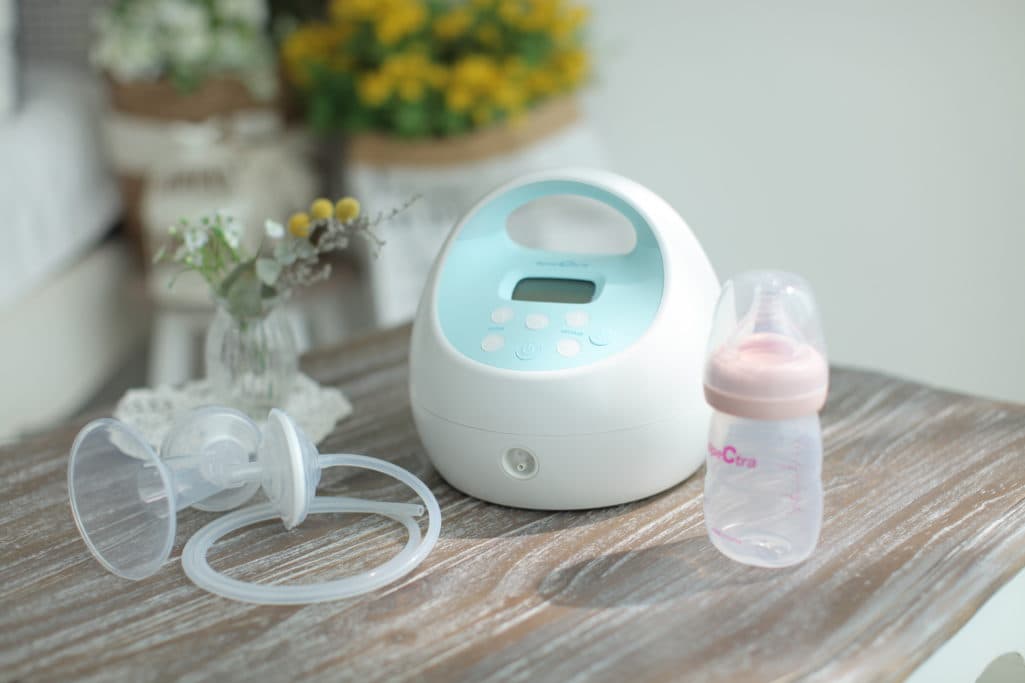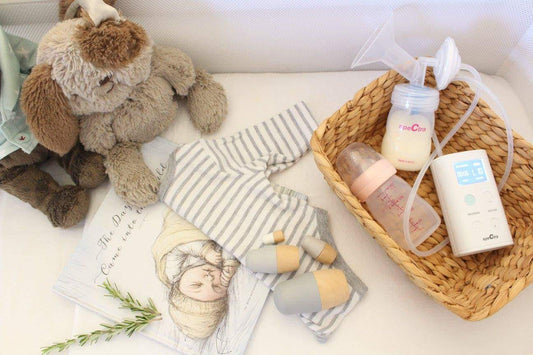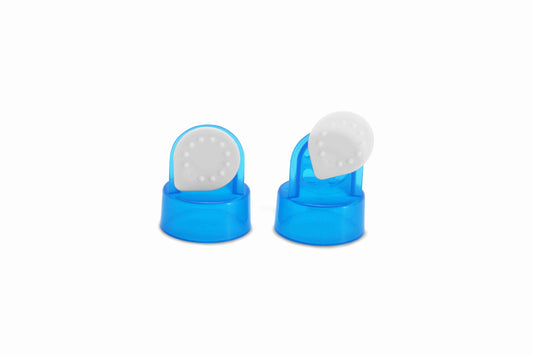Breastfeeding 101 - What happens when you start breastfeeding
If you're a first-time mum, it can be hard to think of your breasts - a body part you may have mostly thought of as decorative until now - as being something you're going to rely on to feed your baby. The transition into parenthood, and becoming a breastfeeding mama is different for everyone - for some it's a breeze, for others, there are challenges. Being prepared and understanding the process is definitely a key part of making it easier. Read through this post so you can understand what's going to happen when you start breastfeeding and what to expect as you kick off on your breastfeeding journey with bub.
Note - this post is intended to apply to mums and babies in normal situations. If you have a special situation like a prem baby or another medical issue, your care provider will be the best source of help.Your breasts 'wake up' during pregnancy
Before getting pregnant, your breasts have been kind of in a dormant state. During pregnancy, your breasts finish developing into a mature organ ready to take on the job nature's assigned them. Milk ducts inside your breast develop and grow larger. You may notice your breasts increase in size and they may be sensitive. From mid-pregnancy, your breasts are capable of producing milk, and some women will notice that they are leaking colostrum (a highly enriched, first milk). If you don't leak during pregnancy, don't worry at all - it has no bearing at all on whether you'll be able to breastfeed. Occasionally women will notice they are leaking mature milk during pregnancy, if this happens no worries, your milk will transition back to colostrum once baby is born.After your baby is born, the process of milk production will kick into gear
Hormones from the placenta stop your body from kicking into milk production mode during pregnancy, but once your baby is born and the placenta is out, your body knows it's time to start making milk for a baby.Attach your baby as soon as possible after the birth
Maybe one of the single most important things you can do after your baby is born is to start feeding, ideally within the first hour. Your baby comes into the world with a very strong instinct to feed from mum. If you and baby are both healthy and alert, letting baby take the lead here is great - your tiny baby is very capable of smelling and hunting out your breast. It's really important to ask for help from someone you feel comfortable with, especially if you're not feeling the best for any reason. If you can lie back with your baby on your chest, and just enjoy your baby and let her do her thing, then breastfeeding may initiate very easily.Tiny amounts of colostrum for the first few days, then mature milk 'comes in' (often resulting in engorgement!)
Your baby's stomach when first born is tiny. As in, really really tiny! Your body will produce small amounts of colostrum, which is packed full of fats, antibodies and other good stuff, and this will be perfect for your baby as her gut wakes up and tries to get used to this whole 'digestion' business. Let your baby attach whenever she wants. Do try to focus on attachment though (and we'll write more about this later) so you can avoid sore nipples. Don't forget to take care of yourself! After a few days, you may wake up to find that your breasts have been replaced by overheated bowling balls. Don't be alarmed - this just means your milk has come in. (For future babies, you usually don't get engorged to this extent!). Keep feeding your baby on demand and the amount of milk your body makes will even out to the amount of milk your baby is asking for. It does take a few days for your body to switch from making tiny amounts of colostrum to large amounts of mature milk, so hopefully you'll have a chance to get used to being a mum, and feeding your baby before you have to deal with the whole bowling ball boobs thing.Supply and demand - how milk production works
Your breasts are basically like a conveyor belt making milk. The more your baby feeds, the more signals your body will receive to kick up production. If your baby doesn't feed, your breasts will be filled with milk and this is like a conveyor getting clogged up with product - too much being made! Slow down! If this happens, your body will understand your baby doesn't need as much milk as was made. For the first weeks, you may find you often have heavy breasts very full with milk which may (unfortunately) leak at the worst moments. Your body will play things on the safe side and make a little too much for now.It's ok to express a little bit of milk to ease engorgement pain, just remember that the more you express the more you're signalling your body to make, so only express just enough to be comfortable again. Standing in a warm shower and letting the water hit your breast while gently expressing a little milk may ease some discomfort. There are also many items on the market (like creams and gel-pads) to help sooth nipple and engorgement pain.
Since you may have a bit of an oversupply at this point, you might have to be particular with breastfeeding positions. Your milk might come out quickly making bub swallow fast, catching air, and upsetting his stomach. Feeding while laying on your side or reclined back with bub on top of you are two ways to slow the speed of your let down.
After 6 weeks or so, milk supply often stabilises and breasts become soft again
Okay now obviously every woman is different, but it's very very common for women to panic when their baby at some point (often around 6 weeks) because they don't understand why their breasts are no longer engorged. However, this is really normal. It's just your body getting a handle on how much is needed and adjusting to suit.Watch out for the a growth spurt around 6 weeks - when babies have a growth spurt, they will feed lots in order to build up your supply. When this happens, just roll with it and feed, feed, feed.
Babies feed a LOT in the first weeks.
Your baby comes into the world with a big need for mum, and specifically, for sucking. The more your baby can feed in the first weeks, the more your milk ducts will activate and the better the milk production machinery will work over the longterm. Because lots of us didn't grow up around breastfeeding women, we often don't realise just how much a newborn baby needs to feed and how normal it is. Use this time to get to know your baby, to become very familiar with your couch and daytime tv, and to get your partner used to bringing you drinks of water and generally being helpful. After a few weeks your baby will start spacing feeds, but in the first week - your baby wants to feed, feed, feed.Quick tip: having a "nursing basket" laying around the house is an easy way to keep some of your favourite items together. You can put some nipple cream, breastfeeding pads, a refillable water bottle, a snack, and a good book in there.
The human digestive track has a major flaw - wind
Unfortunately your baby will probably need some help to get the wind out of them after feeding. The best way to do this is to focus on keeping your baby upright after feeds if at all possible. Rubbing or tapping your baby's back while she's on your shoulder is good, and during the day a baby carrier is also good. Try to stay on top of the whole wind thing!
Signs that you need to get help:
-
If you're feeling severe pain or you can see your nipples becoming damaged
-
If you're feeling overwhelmed or not coping
-
If you can't get your baby to attach and feed well in the first few hours
-
If you're worried about anything
Signs that you're doing an awesome job
- Your baby has 6+ wees a day and bright eyes
-
Your baby's poos have changed from first poo (small amounts of very dark meconium) through to green then and then the pumpkin soup colour that means they're digesting breastmilk.
-
Your baby is latching on and off just fine
-
You're a woman and you've just had a baby





